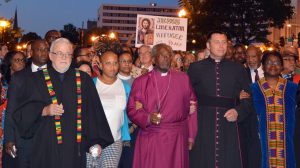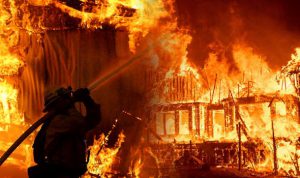I have a confession to make: I talk to things. I talk at home to our cat Mocha, which I guess isn’t too odd, but I also talk to cats and dogs that I meet on the street, and to the birds and squirrels in our neighborhood. I talk to my computer when it is running too slowly. I talk to my keys, or my phone, or my reading glasses when they have run off and are hiding from me.
So I am right at home with Joel 2:21-27, the Old Testament lesson for this Thanksgiving Day, which begins by addressing the natural world: not only the living things, the animals and trees and green plants, but even the dirt itself:
Don’t fear, fertile land [the NRSV reads, “O soil”!];
rejoice and be glad,
for the Lord is about to do great things! (Joel 2:21).
The setting for this remarkable passage is the aftermath of a locust plague, which has decimated Judah. The locusts are described by God as
the cutting locust, the swarming locust, the hopping locust, and the devouring locust . . . my great army[!], which I sent against you (Joel 2:25).
But that is over now, and after the swarm has passed, when the locusts all are gone, reassurance is offered to the community, the “children of Zion” (Joel 2:23), who twice are promised, “my people shall never again be put to shame” (Joel 2:26, 27).

Yet the people also learn that they are part of a larger community than they had known. Just after our reading in Joel comes the most famous passage from this book, quoted by Peter in his Pentecost sermon:
After that I will pour out my spirit upon everyone;
your sons and your daughters will prophesy,
your old men will dream dreams,
and your young men will see visions.
In those days, I will also pour out my
spirit on the male and female slaves. (Joel 2:28-29).
The “children of Zion”—“my people”—includes not just the adult men of the worshipping congregation, but women, children, the aged–even slaves.

Nature itself is also caught up in that community: the animals, the trees, the green plants—yes, even the dirt!
Don’t fear, fertile land;
rejoice and be glad,
for the Lord is about to do great things!
Don’t be afraid, animals of the field,
for the meadows of the wilderness will turn green;
the tree will bear its fruit;
the fig tree and grapevine will give their full yield. (Joel 2:21-22)
All are told not to fear. All are promised life, from God and by God. All are caught up in God’s promises of deliverance, vindication, and freedom from shame. Today, reading these words of Scripture, we too hear God’s promises of deliverance, vindication, and freedom from shame. But we cannot experience those blessings separately and severally. They are not offered to us in that way. We will find them together—all of us–or we will not find them at all.
Community is who we are, but it is also what we do. This past week in Denver, I heard Jim Wallis share a profound statement of faith and call to action, coming from an extraordinary gathering of Christian leaders. Called Reclaiming Jesus: A Confession of Faith in a Time of Crisis, this statement says in part,
WE BELIEVE each human being is made in God’s image and likeness (Genesis 1:26). That image and likeness confers a divinely decreed dignity, worth, and God-given equality to all of us as children of the one God who is the Creator of all things. Racial bigotry is a brutal denial of the image of God (the imago dei) in some of the children of God. Our participation in the global community of Christ absolutely prevents any toleration of racial bigotry. Racial justice and healing are biblical and theological issues for us, and are central to the mission of the body of Christ in the world. We give thanks for the prophetic role of the historic black churches in America when they have called for a more faithful gospel.
If we would be free, brothers and sisters, then we must work to free one another, for until we all are free, none of us are free. We must be willing to draw the circle wide–to find ourselves a part of a larger community than we had known, embracing sisters and brothers we had not known we had.
We must also extend our circle to include all of God’s world, for Joel reminds us that there can be no good for any of us if that good does not include our suffering earth. This truth was brought brutally home by the devastating Camp Fire in California, which has left 81 dead and 699 still missing. While natural disasters such as the Camp Fire are commonly called “acts of God,” eschewing human responsibility, there can be little doubt that we are responsible for this one, through climate change brought on by our own careless greed. We must do better, remembering to treat the earth with responsibility and care.
On this Thanksgiving Day, sisters and brothers, we are going to need a bigger table, for Scripture reminds us that our family is larger than we had known. Thanks be to God for all our community!



